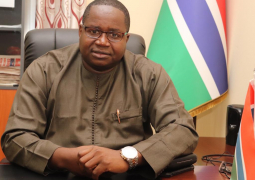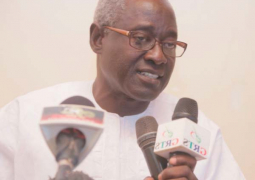The forum formed part of The Gambia’s ongoing Security Sector Reform (SSR) strategy, which seeks to transform security institutions into accountable, professional, and people-centred bodies that uphold the rule of law, safeguard human rights, and rebuild public trust.
The event aimed at delivering greater knowledge of SSR laws and policies, a clear roadmap for legislative reform and advocacy, and strengthened collaboration among state institutions, civil society, and oversight bodies.
The forum involved plenary discussions and group activities designed to ensure gender balance and representation of marginalised voices.
As The Gambia continues its post-2017 democratic transition, the Collaborative Forum is seen as a vital platform to secure broad consensus on reforms and to reinforce both political will and civic ownership of a security sector built on accountability, human rights, and public trust.
Lamin Kinteh, Chief of Staff at the Office of National Security Advisory (ONS), in delivering the keynote address on behalf of the National Security Advisor, underlined the importance of legislative reform in the country’s transition.
“The Gambia’s security sector reform journey is guided by a clear vision; building accountable, professional and inclusive security institutions that uphold the rule of law, safeguard human rights and rebuild trust in the sector,” he said.
Kinteh stressed that reform is not the task of a single institution but a collective responsibility.
He said the forum provided an opportunity to review revised and draft security laws, reflect on challenges and chart practical strategies for joint advocacy and adoption.
Mandisa Mashologu, UNDP Resident Representative, praised the government’s leadership and urged participants to embrace inclusivity.
“Legislative reform is not just a technical exercise. It is an essential process for transformation and accountability,” she stated.
She recalled UN Security Council Resolution 2151, which defines national ownership, inclusivity, and accountability as guiding principles for SSR, and emphasised that women, youth and marginalised communities must have a voice in shaping the country’s security future.
For his part, UN Resident Coordinator Karl Fredrick Paul reaffirmed the United Nations’ commitment to supporting The Gambia’s democratic transition and reform process.
“Effective security sector reform is indispensable to the realization of the Sustainable Development Goals, particularly Goal 16 on Peace, Justice and Strong Institutions,” he said.
Paul pointed to the recent passage of the National Security Council Bill as a landmark political achievement, and urged that reforms be inclusive, rights-based, and aligned with international human rights obligations.
He welcomed the validation of new gender and anti-harassment policies as a sign of the government’s commitment to inclusivity.
Deputy Permanent Secretary Lamin Gassama, speaking on behalf of the Minister for Interior, described the SSR process as a deliberate, people-centred political project.
“The foundation of any credible security sector reform is a strong legal and policy framework. Without them, reforms remain incomplete, vulnerable to inconsistencies and lacking sustainability,” he said.
He highlighted progress on key legal reviews, including the Immigration Bill, Fire and Rescue Service Bill, Police Bill, Prisons Bill, and Drug Control Bill, many of which are advancing through Cabinet and the Ministry of Justice. Declaring the meeting officially open, Gassama reaffirmed the government’s determination to complete the reforms and ensure they are grounded in human rights and democratic principles.
Read Other Articles In Headlines
GCCI engages financial service providers dialogue on agric financing
Jul 21, 2022, 1:04 PM




